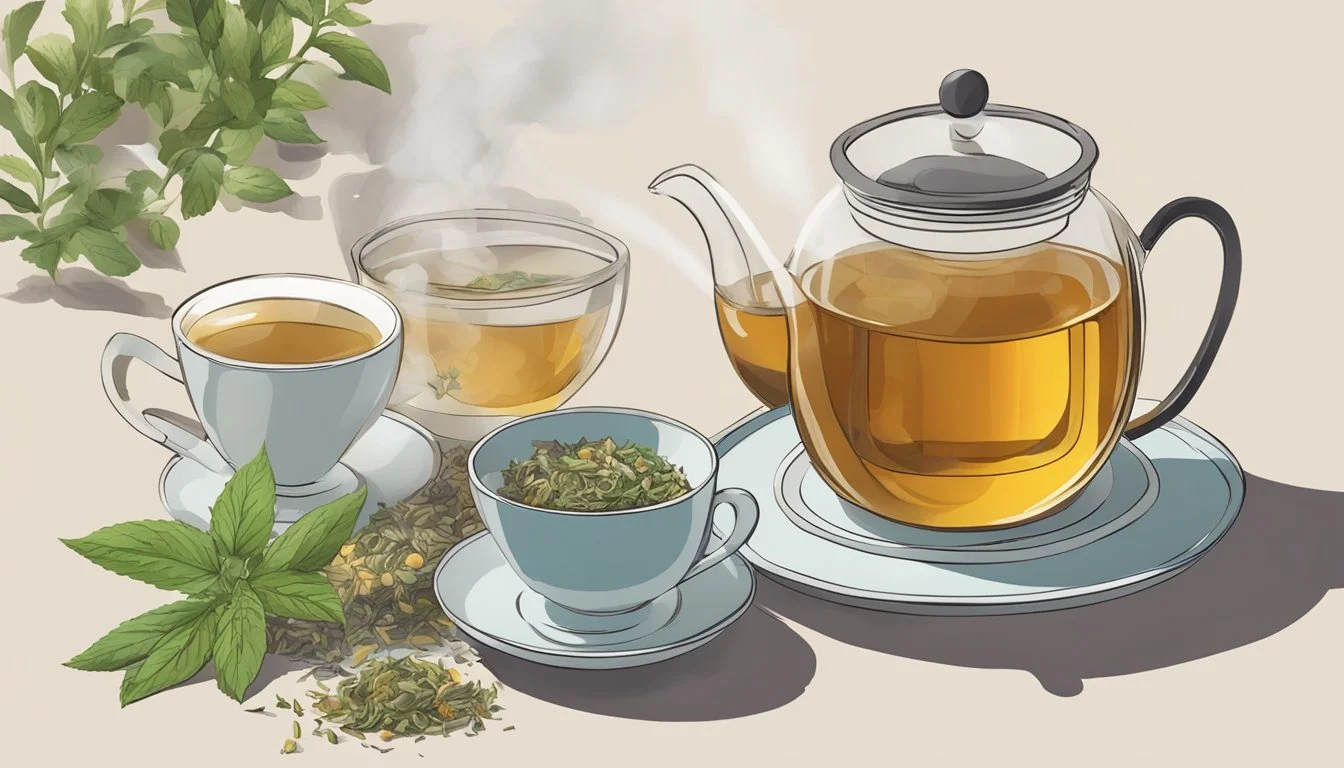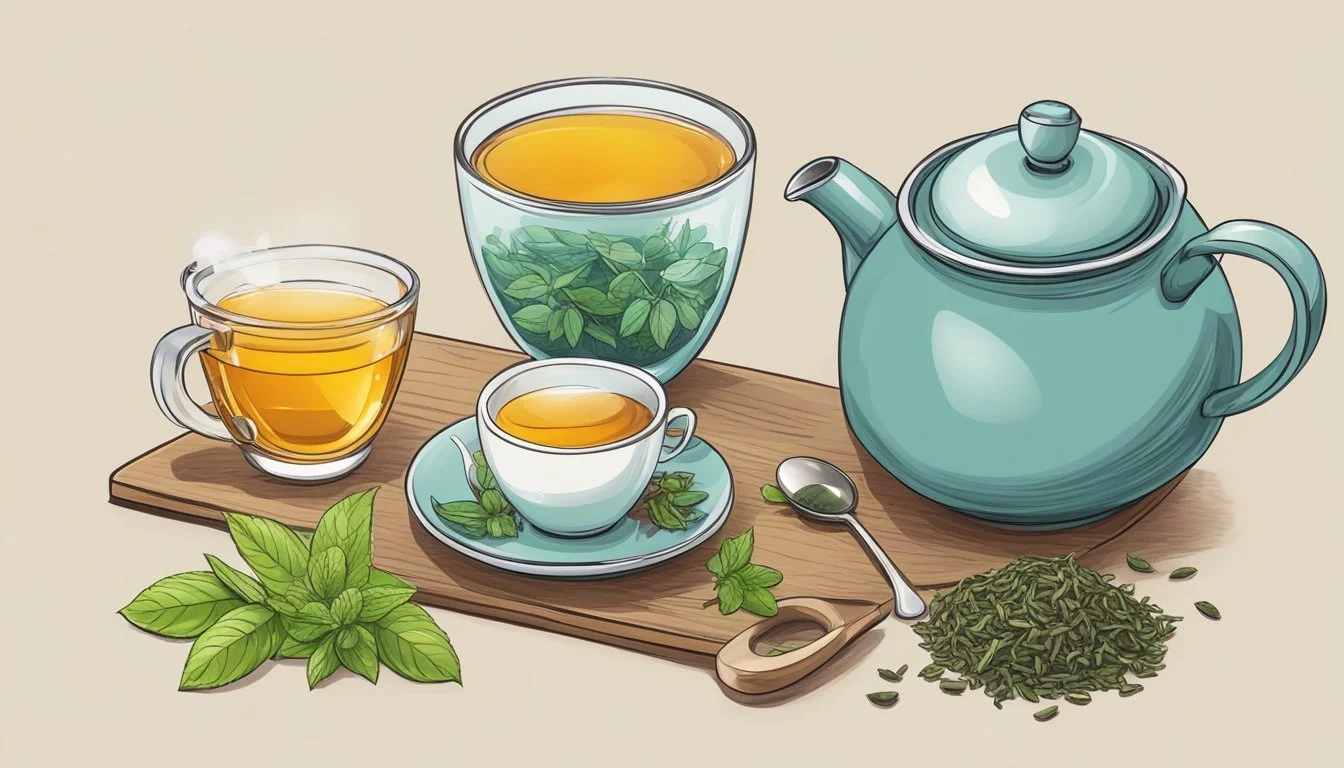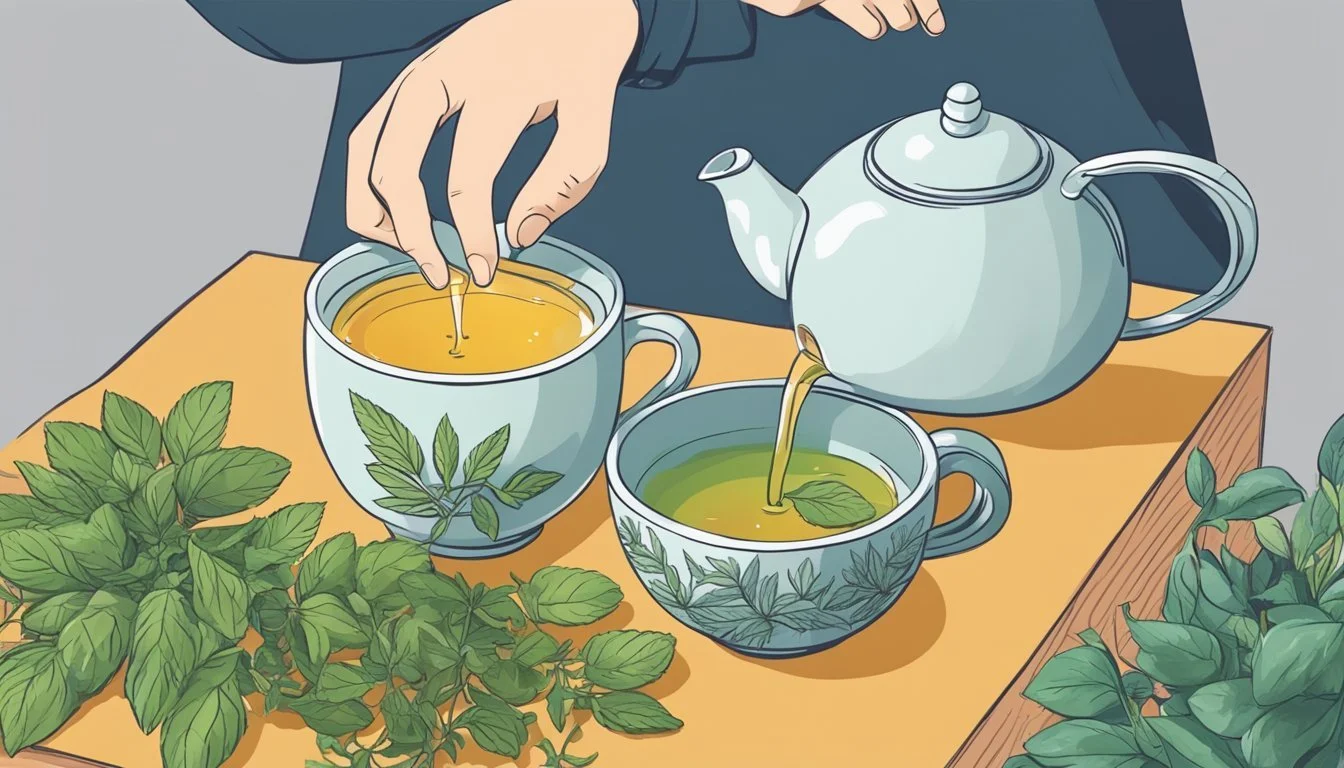How Much Herbal Tea Per Day Is Too Much?
Understanding Safe Consumption Limits
Herbal teas are widely appreciated for their variety of flavors, aromas, and potential health benefits. While moderate consumption is generally considered safe and beneficial for most people, it's important to note that excessive intake of herbal tea can lead to a range of adverse effects. Certain herbal teas can cause issues such as headaches, nervousness, digestive problems, and sleep disturbances when consumed in large quantities. Additionally, some herbal teas contain compounds that, in excessive amounts, can be toxic.
Determining the appropriate amount of herbal tea to consume daily can vary from person to person, depending on individual sensitivity and the type of herbal tea. Typically, drinking about three to four cups of herbal tea per day is considered safe for most individuals and is unlikely to cause adverse health effects. However, some herbal teas may interact with medications and affect the absorption of nutrients due to their chemical composition.
It is also essential to consider that different herbal teas have distinct properties. Some herbal teas function as diuretics and can lead to dehydration if consumed in large amounts. Furthermore, excessive caffeine intake from certain herbal teas may have negative impacts on health. Consumers are advised to be aware of their personal health conditions and consult with healthcare professionals when incorporating herbal teas into their routines, especially if they plan to consume it frequently or in larger amounts.
Understanding Herbal Tea
In this section, we explore what constitutes herbal tea, its variety of types and flavors, and its caffeine content, providing a comprehensive view of these soothing beverages.
Defining Herbal Tea
Herbal tea, distinct from traditional tea varieties like green, black, white, and oolong, does not originate from the Camellia sinensis plant. Instead, it is an infusion made from an array of different plants, herbs, and spices. Herbal teas, therefore, are not true teas in the strictest sense but are often categorized as such due to their preparation and consumption methods.
Types and Flavors
Herbal teas offer a vast spectrum of flavors and can be derived from various parts of plants, including leaves, flowers, seeds, roots, or even bark. Some popular examples include:
Chamomile Tea: Known for its calming properties, usually made from dried chamomile flowers.
Peppermint Tea: Recognized for aiding digestion and made from peppermint leaves.
Hibiscus Tea: A tart, cranberry-like flavor sourced from the hibiscus plant.
Rooibos Tea: Hailing from South Africa, it is rich in antioxidants and has a sweet, earthy taste.
Caffeine Content in Herbal Tea
Herbal teas are largely caffeine-free, making them a popular choice for those looking to reduce their caffeine intake. However, it is worth noting that some herbal teas may contain caffeine if they happen to include parts of the Camellia sinensis plant or other caffeine-containing ingredients. Consumers should check labels or ingredient lists if caffeine consumption is a concern.
Health Benefits of Herbal Tea
Herbal teas offer a variety of health benefits, ranging from antioxidant properties to digestive health support. Each type of herbal tea can bring specific advantages to the table, contributing positively to overall well-being.
Antioxidant Properties
Herbal teas are rich in antioxidants, which help combat the damage caused by free radicals in the body. For instance, green tea, derived from the Camellia sinensis plant, is known for its high concentration of antioxidants that may reduce the risk of cancer and heart disease.
Metabolic Boosting Effects
Certain herbal teas are recognized for their metabolic boosting effects. Green tea, specifically, has been studied for its ability to aid in weight loss and fat burning due to its components that can enhance metabolism.
Anti-inflammatory Benefits
The anti-inflammatory properties of herbal teas are beneficial in managing inflammation and may contribute to reducing the risk of various chronic conditions, including type 2 diabetes and heart disease. Ingredients like ginger contain compounds that can soothe inflammation throughout the body.
Digestive Health Support
Herbal teas can play a significant role in supporting digestive health. Teas like peppermint and chamomile are noted for their ability to aid in digestion, mitigate stomach issues, and they can even help in regulating blood sugar levels. This supports the management of blood sugar levels and overall digestive wellness.
Potential Risks and Side Effects
Consumption of herbal tea in moderation is generally safe for most individuals. However, drinking too much can have various side effects, potentially influencing one's health and wellbeing. These risks range from overconsumption of caffeine to interactions with medications and effects during pregnancy.
Caffeine Overconsumption
Excessive intake of herbal teas that contain caffeine can lead to caffeine overconsumption. Symptoms may include insomnia, heartburn, anxiety, and headaches. Specific teas such as yerba mate or guarana can have high caffeine content, leading to such side effects when consumed in large amounts.
Impact on Iron Absorption and Anemia
Herbal teas, especially those high in tannins, can inhibit iron absorption, elevating the risk of anemia. This is particularly important for individuals with pre-existing conditions that affect iron levels. Herbal teas may contribute to nausea and an upset stomach as well, which can indirectly affect iron absorption.
Interaction With Medications
Certain compounds in herbal teas can interact with medications, altering their effectiveness. For example, tea can affect blood clotting and may not be recommended for those on blood-thinning medications, potentially increasing the risk of bleeding.
Effects During Pregnancy
Pregnant individuals should exercise caution with herbal tea intake. Some teas can have stimulating effects or contain compounds with unknown impacts on the pregnancy. Excessive consumption may also elevate the risk of miscarriage due to high levels of certain compounds or caffeine. It's advisable for pregnant women to consult healthcare providers regarding safe herbal tea consumption.
By understanding these risks and maintaining moderate consumption of herbal teas, individuals can enjoy the benefits of these beverages while minimizing potential adverse effects.
Safe Consumption Practices
The key to enjoying herbal teas safely is to consume them in moderation and be aware of their effects on the body. By paying attention to the amount one drinks, any symptoms that may arise, and the method of brewing, tea enthusiasts can maintain a balanced approach to herbal tea consumption.
Determining the Right Amount
Moderation: An individual's ideal herbal tea intake varies, but generally, 2-3 cups per day are considered moderate and safe for most people. Factors including body weight, caffeine sensitivity, and age can affect how much herbal tea one can comfortably consume.
Organic Options: Choosing organic herbal teas can ensure that the product is free from pesticides and other contaminants.
Vegetarian/Vegan Considerations: Herbal teas are inherently vegetarian and vegan-friendly, with no animal-derived ingredients.
Monitoring Symptoms of Overindulgence
One should stay vigilant for symptoms such as headaches, nervousness, or gastrointestinal issues, which can signal overconsumption of herbal teas. Excessive amounts of certain herbs can indeed become toxic; for example, teas containing comfrey or ephedra have potential health risks if ingested in large quantities.
Hydration: Balance herbal tea consumption with adequate water intake to prevent dehydration.
Brewing Techniques
The preparation of herbal tea plays a crucial role in its safety and potency.
Brewing:
Duration: Steeping time should align with recommendations—usually between 5 to 10 minutes.
Temperature: Use boiling water to eliminate microbes, ensuring the tea is safe to drink.
Supplements:
Milk: Adding milk may mitigate the absorption of beneficial plant compounds.
Lead Contamination: Utilize filtered water in brewing to minimize exposure to lead and other heavy metals.
Balancing With Overall Diet
Herbal tea should complement a well-balanced diet.
Dietary Diversity: Incorporate a variety of herbal teas to minimize the risk of consuming excessive amounts of any single potentially potent herb.
Interaction with Medications: Be mindful of potential interactions between herbal teas and prescription medications, and consult with a healthcare provider if necessary.
Considerations for Special Populations
Certain groups of individuals need to pay particular attention when consuming herbal tea due to potential impacts on health and treatment regimens.
Herbal Tea for Diabetics
Individuals with diabetes need to monitor their intake of herbal tea closely. Herbal teas can affect blood sugar levels; some might lower blood glucose, while others may have the opposite effect. They should especially avoid herbal teas high in sweeteners or those which could potentially interact with diabetes medications. Consistent monitoring of blood glucose levels is encouraged to observe any changes.
Concerns for Heart Patients
Patients with heart disease or hypertension should be cautious as some herbal teas may interact with their medication or affect heart rate and blood pressure. Teas that have a high caffeine content or stimulate increased blood pressure or heart rate are of particular concern. Heart patients should opt for decaffeinated varieties and stay informed about the specific herbs that might lead to complications such as increased risk of stroke or inflammation.
Advice for Pregnant Women
Pregnant women need to consider the potential effects of herbal tea on their health and the developing fetus. Some herbal teas may pose complications during pregnancy, such as increasing the risk of miscarriage or causing hormonal fluctuations. It's advised to avoid teas with high levels of caffeine and to consult a healthcare provider regarding safe consumption. There's also a risk of herbal teas affecting blood pressure levels, hence moderation is paramount.
Incorporating Herbal Tea Into a Healthy Lifestyle
Herbal teas have found a revered place in healthy living, offering benefits that range from weight management to enhancing immune responses. When enjoyed in moderation, these natural brews can be a calming addition to one's daily routine.
Role in Weight Management
Herbal teas may play a supportive role in weight management due to their potential to promote satiety and minimize overeating. For example, green tea is often associated with weight loss efforts because it contains compounds like catechins and caffeine, which can help in boosting metabolism. Consumption should be aligned with individual dietary needs, and it's crucial to integrate it with a balanced diet and regular exercise.
Boosting the Immune System
Consuming herbal teas like ginger and echinacea may contribute to a more robust immune system. The antioxidants and vitamins present in these teas can help protect the body against oxidative stress and support overall health. Remember, however, that herbal teas are not a cure-all and should complement a lifestyle that includes a nutritious diet and adequate sleep.
Stress Reduction and Relaxation
Herbal teas such as chamomile or valerian root are prized for their natural relaxation properties. They may help reduce feelings of stress and support better sleep by calming the mind and easing restlessness. Regular inclusion of these teas within one’s evening routine can aid in achieving a state of relaxation before bedtime.
Frequently Asked Questions
This section addresses common misunderstandings and provides reliable sources for information on the consumption of herbal tea.
Debunking Common Myths
Myth: Any amount of herbal tea is safe to consume.
Fact: Excessive intake of herbal tea can lead to health issues such as nervousness, sleep disturbances, and stomach problems. Some herbal teas contain caffeine or other substances like tannins and polyphenols which should be consumed in moderation.
Myth: Herbal teas have no real health benefits.
Fact: Many herbal teas contain antioxidants, catechins, theanine, and other beneficial compounds. For instance, chamomile tea is known for its calming effects, and peppermint tea may help with digestion.
Sources of Herbal Tea Information
Scientific Studies: They provide evidence-based information on the effects of various compounds found in herbal teas, such as caffeine, tannins, polyphenols, and theanine.
Healthcare Providers: They can offer personalized advice based on individual health needs, especially in relation to herbal tea interactions with medications or health conditions.
Tea Associations: Such associations often have comprehensive resources on different types of teas, including herbal teas, yerba mate, matcha, and guidelines for their consumption.
Conclusion
Moderation in the consumption of herbal tea is key to harnessing its benefits without encountering adverse effects. While herbal teas are generally safe and offer various health advantages, overdoing it can lead to negative outcomes such as headaches, stomach issues, and sleep disturbances. Individuals should be mindful of the type of herbal tea they consume, as some can be toxic in large quantities.
A typical guideline is to limit intake to 3-4 cups per day, ensuring it does not interfere with nutrient absorption or exacerbate health issues. For those with specific medical conditions or who are undergoing surgery, it is crucial to follow the advice of healthcare professionals regarding tea consumption.
Tips for Balanced Tea Consumption - Pay attention to the body's response to tea - Consult with a healthcare provider if unsure - Be aware of the caffeine content in certain teas - Avoid exceeding the recommended daily intake
The potential benefits of tea, such as antioxidant properties and a calming effect, can contribute to overall well-being. Yet, each individual's tolerability may vary. Those enjoying herbal teas can continue to do so with an awareness of personal thresholds and a commitment to conscious consumption.









